The relationship between North Korea and Russia is complex and multifaceted, influenced by historical, geopolitical, and strategic factors. Over the years, their ties have evolved through periods of cooperation, tension, and occasional alignment of interests. To provide a comprehensive overview, let’s delve into various aspects of their relationship, including historical background, political dynamics, economic interactions, and contemporary developments.
Historical Background: The relationship between North Korea and Russia dates back to the Cold War era when both countries were part of the communist bloc. The Soviet Union played a significant role in the establishment of North Korea, providing support to Kim Il-sung’s regime during the Korean War (1950-1953). However, following the collapse of the Soviet Union in 1991, Russia’s influence in the region waned, leading to a period of relative neglect in bilateral relations.
Political Dynamics: Despite the decline in direct political influence, Russia has maintained diplomatic ties with North Korea. These relations are characterized by a pragmatic approach, with Russia often seeking to balance its interests between North Korea and other regional powers, such as China and the United States. Russia has occasionally acted as a mediator in efforts to resolve tensions on the Korean Peninsula, though its influence in this regard is limited compared to other stakeholders.
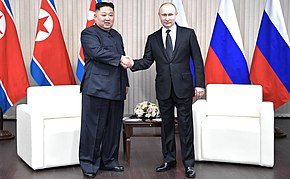
Geopolitical Considerations: For Russia, North Korea serves as a buffer state between itself and U.S. allies in East Asia, particularly South Korea and Japan. Russia views stability on the Korean Peninsula as essential for its security interests, as instability or conflict in the region could have spillover effects on neighboring areas, including Russia’s Far East. Additionally, Russia seeks to maintain a degree of influence in Northeast Asia to counterbalance the dominance of other major powers in the region.
Economic Interactions: Economic ties between North Korea and Russia have fluctuated over the years, influenced by international sanctions and geopolitical developments. While Russia has expressed interest in enhancing economic cooperation with North Korea, particularly in the areas of energy, transportation, and trade, significant barriers exist, including North Korea’s isolationist policies, concerns over sanctions compliance, and the dilapidated state of North Korea’s economy.
Energy Cooperation: One area of potential cooperation between North Korea and Russia is energy. Russia has proposed various projects, such as the construction of gas pipelines and the modernization of North Korea’s energy infrastructure, to export Russian energy resources to South Korea via North Korean territory. However, progress on these projects has been slow, hampered by geopolitical tensions, financial constraints, and technical challenges.
Military Relations: While military cooperation between North Korea and Russia is limited compared to North Korea’s relationship with China, there have been instances of collaboration, particularly in the form of arms sales and military technology transfers. These transactions have raised concerns among the international community, as they could contribute to the proliferation of weapons and exacerbate regional tensions.
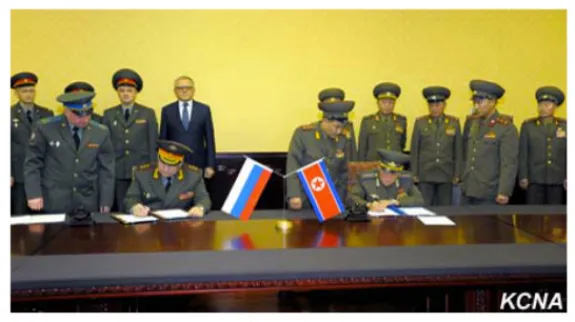
Diplomatic Engagement: In recent years, there have been efforts to revitalize diplomatic engagement between North Korea and Russia. High-level visits and diplomatic exchanges have taken place, signaling a willingness on both sides to maintain dialogue and explore opportunities for cooperation. However, these efforts have yet to yield substantial breakthroughs in addressing the core issues affecting the Korean Peninsula, such as denuclearization and regional security.
Current Developments: In the context of shifting geopolitical dynamics, including tensions between the United States and North Korea, as well as China’s growing assertiveness in the region, Russia’s role in Northeast Asia is evolving. Russia has sought to capitalize on its diplomatic channels with North Korea to assert its relevance in regional affairs and potentially shape the outcome of negotiations on the Korean Peninsula. However, Russia’s influence remains constrained by broader geopolitical factors and the dominance of other major powers in the region.
In conclusion, the relationship between North Korea and Russia is characterized by a combination of historical ties, geopolitical considerations, and pragmatic diplomacy. While both countries share a common history rooted in communism and have maintained diplomatic relations, their partnership is limited by a range of factors, including international sanctions, divergent economic interests, and broader geopolitical dynamics. Despite occasional efforts to enhance cooperation, significant challenges remain in realizing the full potential of their relationship, particularly in the context of ongoing tensions on the Korean Peninsula and competition among major regional powers.
North Korea-Russia relation in Ukraine conflict
The involvement of North Korea and Russia in the context of the Ukraine war illustrates the complexities of international relations and how global conflicts can intertwine different countries based on their strategic interests and political alliances. As of my last update in April 2023, the situation has been dynamic, with various developments highlighting the roles and positions of North Korea and Russia in the ongoing conflict in Ukraine.
Russia’s Position and Actions: Russia’s military intervention in Ukraine, beginning in 2014 with the annexation of Crimea and escalating significantly in February 2021 with a full-scale invasion, has drawn international condemnation and a series of sanctions aimed at isolating Moscow economically and politically. Russia has sought support from its traditional allies and partners to navigate the consequences of these actions, looking for ways to circumvent sanctions, secure military and economic assistance, and gain international legitimacy for its actions.
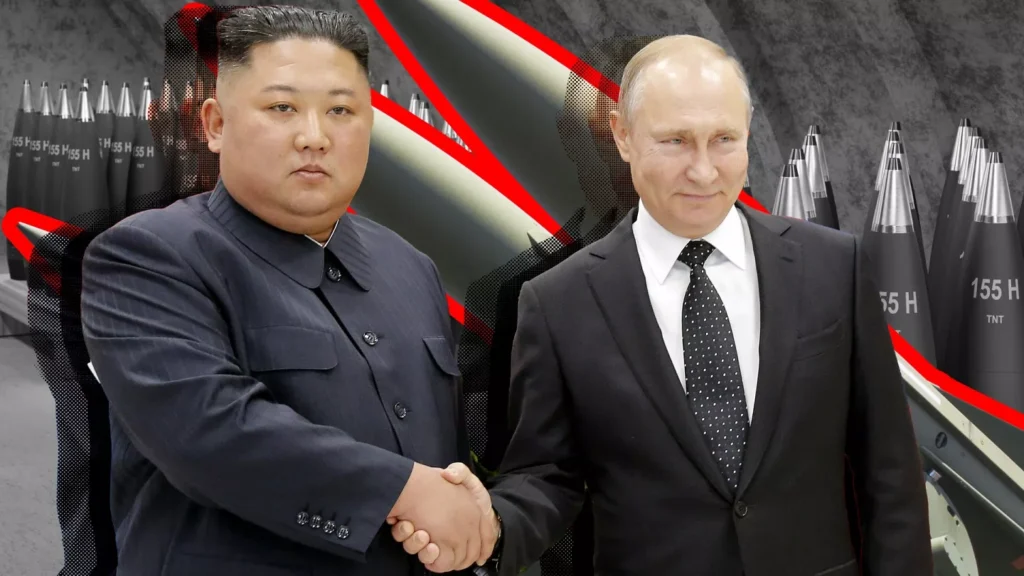
North Korea’s Support for Russia: North Korea, under the leadership of Kim Jong-un, has been one of the few countries to openly support Russia’s actions in Ukraine. This support is largely rhetorical but is significant in the context of North Korea’s international relations, as Pyongyang views Moscow as a counterbalance to American influence and a potential source of economic and military aid. North Korea has blamed the United States and NATO for provoking Russia and has endorsed Russia’s narrative of seeking to “defend” itself against Western expansionism.
Allegations of Arms Supplies: There have been allegations and concerns in the international community that North Korea might supply military aid to Russia to support its war effort in Ukraine. Given North Korea’s extensive stockpile of Soviet-era weapons and ammunition, such support could help Russia mitigate the impact of Western sanctions on its military supplies. However, the extent of military cooperation and arms transfers between North Korea and Russia, in the context of the Ukraine conflict, is difficult to verify and remains a subject of speculation and intelligence assessments.
Strategic Implications: North Korea’s support for Russia in the Ukraine conflict has strategic implications. For Pyongyang, backing Moscow is an opportunity to strengthen bilateral ties and secure political and possibly economic concessions. For Russia, North Korean support, even if largely symbolic, adds a dimension to its global diplomatic campaign to justify its actions in Ukraine and rally support among countries that are skeptical of Western intentions or resentful of Western dominance in international affairs.
International Reactions: The international community, particularly Western countries, has viewed any potential military cooperation between North Korea and Russia with concern. The United States has warned that any arms deal between North Korea and Russia would result in sanctions against entities involved. Such developments could further isolate both North Korea and Russia, complicating efforts to resolve the conflict in Ukraine diplomatically.
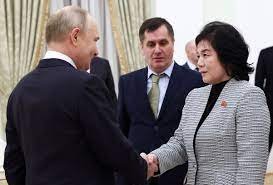
Conclusion: The relationship between North Korea and Russia in the context of the Ukraine war underscores the multifaceted nature of international alliances and the global impact of regional conflicts. While North Korea’s support for Russia may offer Moscow a semblance of international backing, it also highlights the challenges of navigating a world increasingly divided by geopolitical tensions. The potential for military cooperation between North Korea and Russia in this context remains a contentious issue, with significant implications for international security and the efforts to achieve peace in Ukraine.
Russia-South Korea at international issue
The relationship between Russia and South Korea in international affairs is complex, characterized by a mixture of cooperation and competition, influenced by broader regional dynamics, historical legacies, and global geopolitical shifts. Their interactions span various domains, including economic ties, diplomatic engagements, security concerns, and responses to global challenges.
Economic and Energy Cooperation: One of the pillars of Russia-South Korea relations has been economic and energy cooperation. South Korea, as one of the world’s leading economies with a high energy demand, views Russia as a significant source of natural resources, including oil and gas. There have been discussions and projects aimed at increasing energy exports from Russia to South Korea, including potential pipeline projects and liquefied natural gas (LNG) supplies. Moreover, South Korean companies have shown interest in investing in Russia’s Far East, seeking opportunities in sectors like energy, infrastructure, and agriculture, although geopolitical tensions and sanctions on Russia pose challenges to these endeavors.
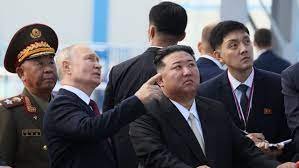
Technological and Industrial Collaboration: Beyond energy, there is a mutual interest in technological and industrial collaboration. South Korea’s advanced technologies and manufacturing capabilities in areas such as electronics, shipbuilding, and automobiles complement Russia’s resource-based economy and its need for modernization. Joint ventures and investment projects have been explored to bolster bilateral trade and economic ties, although progress has often been uneven and affected by broader geopolitical factors.
Diplomatic and Security Concerns: Diplomatically, Russia and South Korea maintain an active dialogue, including regular high-level meetings and discussions on regional security issues. However, security concerns, particularly those related to North Korea’s nuclear program and regional stability, present both opportunities and challenges for Russia-South Korea relations. Russia plays a critical role in the Six-Party Talks (now stalled) and other multilateral efforts aimed at denuclearizing the Korean Peninsula, though its influence is arguably less than that of China or the United States.
South Korea seeks to balance its strategic partnership with the United States and its desire to engage with North Korea with the need to maintain a functional relationship with Russia. Moscow, for its part, uses its position to assert its role as a major player in Northeast Asian security, often advocating for dialogue and a reduction of military tensions while opposing the deployment of U.S. missile defense systems in South Korea.
Responses to Global Challenges: On the global stage, Russia and South Korea face numerous challenges that require cooperation, including climate change, public health crises like the COVID-19 pandemic, and cybersecurity threats. Both countries have expressed interest in collaborating on these and other issues, recognizing that joint efforts can be beneficial in addressing global challenges.
The Impact of International Sanctions on Russia: The international sanctions imposed on Russia, particularly in the wake of its actions in Ukraine, have a complicated impact on Russia-South Korea relations. South Korea, aligned with the United States and other Western countries, has participated in sanctions regimes, which has inevitably affected bilateral economic projects and investments. South Korean companies are often cautious about engaging with Russian counterparts, mindful of the potential legal and reputational risks associated with sanctions.
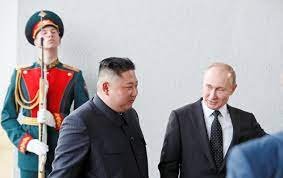
Conclusion: The relationship between Russia and South Korea in international affairs is multifaceted, encompassing a wide range of cooperative endeavors and shared challenges. While economic interests and the potential for technological and industrial collaboration offer a foundation for positive engagement, geopolitical tensions, and security concerns introduce elements of caution and complexity. As both countries navigate the evolving landscape of international relations, their ability to balance these diverse factors will determine the future trajectory of their bilateral relationship.
